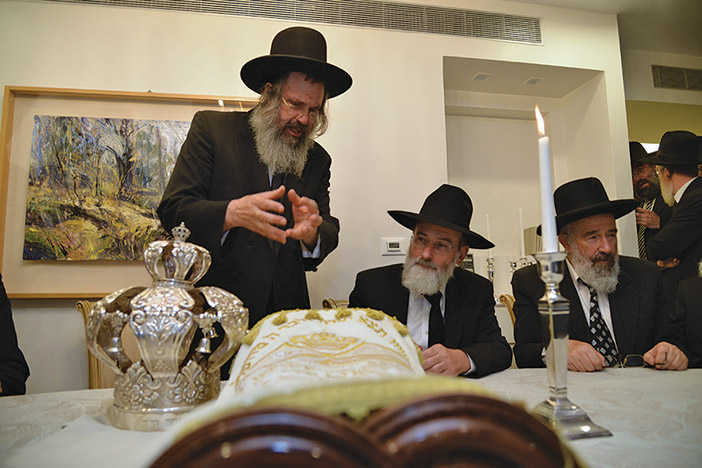

It was a powerful maamad of kavod haTorah attended by numerous prominent roshei yeshiva and rabbanim, including HaGaon HaRav Boruch Mordechai Ezrachi, shlita, rosh yeshiva of Yeshiva Ateres Yisrael of Yerushalayim, HaGaon HaRav Dovid Cohen, shlita, rosh yeshiva of the Chevron Yeshiva, and HaGaon HaRav Yitzchak Yechiel Eherenfeld, shlita, rav of Kiryat Mattersdorf.
The event was a hachnosas sefer Torah to Yeshiva Ohr Elchonon. At the event, the founding roshei yeshiva of Yeshiva Ohr Elchonon, HaGaon HaRav Simcha Wasserman, zt”l, a son of Rav Elchonon Wasserman, rosh yeshiva of Baranovitch, and HaGaon HaRav Moshe Mordechai Chodosh, zt”l, who served as rosh yeshiva for decades, were remembered. Their pivotal role in creating one of Eretz Yisrael’s most distinguished network of yeshivos, at a time when many naysayers thought that the yeshiva would never succeed, was highlighted.
The hachnosas sefer Torah took place on Chol Hamoed Sukkos. The sefer Torah was given by the Goldfinger family of Los Angeles. The procession began at the home of Rav Dovid Hofstedter, nasi of Dirshu, located in the Ganei Geulah neighborhood of Yerushalayim, not far from the campus of Yeshiva Ohr Elchonon.
Rav Hofstedter enjoyed an extremely close relationship with the yeshiva’s founder, Rav Simcha Wasserman, and he hosted Rav Simcha on Rav Simcha’s frequent trips to Toronto. Through Rav Simcha, Rav Hofstedter became very close to Rav Moshe Chodosh and they maintained a close relationship until Rav Moshe’s untimely passing just over two years ago.
The kavod haTorah at the event was manifest by the participation of so many prominent gedolim and rabbanim who gathered at Rav Hofstedter’s home to give honor to the yeshiva. In addition to Rav Ezrachi and Rav Dovid Cohen, the current roshei yeshiva of Ohr Elchonon, Rav Aryeh Chodosh, a son of Rav Moshe Chodosh, and Rav Tzvi Weinfeld, a son-in-law of Rav Moshe, were in attendance along with many prominent talmidim of Rav Moshe Chodosh who are today roshei yeshiva in their own right.
Before the procession, with its enthusiastic singing and dancing from Rav Hofstedter’s apartment to the yeshiva, a beautiful gathering with drashos in honor of the occasion was held. The gedolim and rabbanim, seated at the head table in front of the sefer Torah, spoke in honor of the Torah.
Rav Dovid Hofstedter reminisced about the early years of the yeshiva. “I remember decades ago when the yeshiva was established. At the time, Rav Simcha Wasserman was an elderly man, in his 80s, and Rav Moshe Chodosh was a relatively young man. They came to Toronto with a dream of opening a yeshiva which, in Rav Simcha’s words, would be a matzeiva for his illustrious father, Rav Elchonon Wasserman, who had been murdered by the Nazis in Kovno and had no matzeiva. There were plenty of skeptics and naysayers who questioned, ‘How will Rav Simcha, an elderly man, pull this off? How can a young man like Rav Moshe Chodosh take on such an ambitious project?’”
Rav Hofstedter explained with a question on the haftarah that was read on the first day of Sukkos. “The pasuk there states that at the end of days, the remaining nations of the world will come and celebrate Sukkos. The pasuk goes on, ‘And if they do not come to celebrate, lo alayhem yihyeh hagashem—they will not have rain.’
“What connection do the nations of the world have with Sukkos?” Rav Dovid asked. “Some meforshim explain that celebrating Sukkos doesn’t mean sitting in the sukkah but rather that the nations will bring the korbanos.”
Still, why will they specifically bring korbanos on Sukkos?
The connection of the nations with Sukkos is that Sukkos is the holiday of the harvest. It is the time of year when Hashem bestows His shefa of bracha on us. At the time of Moshiach, even the nations will understand that the shefa comes only from Hashem. They will realize that although they have no connection to the mitzvah of sukkah and they cannot sit in the shadow of Hashem, they will still understand that all material bounty comes from Hashem. If they do not recognize this, then Hashem will take away that shefa and “lo alayhem yihyeh hagashem—they will not have rain.”
From here we learn that when a person sees the hand of Hashem, it is incumbent on him to recognize it and publicly declare that all of his success and siyata dishmaya comes directly from Hashem.
Yeshiva Ohr Elchonon has grown into one of klal Yisrael’s most distinguished yeshivos despite the naysayers’ predictions at its inception. Perhaps the secret to its success was the fact that Rav Simcha Wasserman and Rav Moshe Chodosh always saw the yad Hashem in everything they did and recognized that the entire shefa, spiritual and material, was siyata dishmaya. At this maamad of kavod haTorah we see the fruits of their labor and their emunah!
As the massive crowd enthusiastically danced the sefer Torah to its new home, the pervasive simcha was the profound simcha of the knowledge that Hashem was continuing to bless the yeshiva, along with the successors of Rav Simcha and Rav Moshe, with great siyata dishmaya!
By Yosef Sosnow









